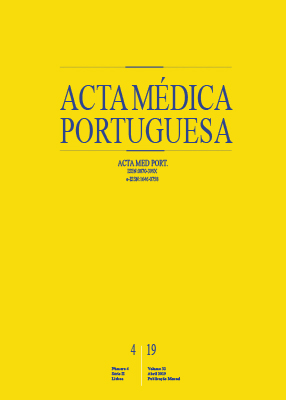Validation of The Alcohol, Smoking and Substance Involvement Screening Test (ASSIST) Among University Students
DOI:
https://doi.org/10.20344/amp.10650Keywords:
Alcohol-Related Disorders, Portugal, Smoking, Students, Substance-Related Disorders, Surveys and Questionnaires, UniversitiesAbstract
Introduction: The present study aims to culturally adapt and explore the psychometric properties of Portuguese version of the Alcohol, Smoking and Substance Involvement Screening Test, among university students.
Material and Methods: A validation, cross-sectional study, with data collected through a questionnaire comprised of sociodemographic and substance consumption measures (Fagerström test for Nicotine Dependence; Drinking Motives Questionnaire – Revised, and The Alcohol, Smoking and Substance Involvement Screening Test version 3.1). The sample was composed by 338 students (51.8% male), with a mean age of 20.6 years old (standard deviation = 3.4). To examine the factor structure, an exploratory factor analysis was performed. The internal consistency and convergent validity were also evaluated.
Results: The ‘Tobacco’ and ‘Cannabis’ subscales were composed by 1 factor and ‘Alcoholic Beverages’ by 2 factors. Internal consistency ranged between 0.556 and 0.842 (Cronbach’s ɑ). Statistically significant associations were observed between being a current smoker, binge-drinking and drinking motives with hazardous consumption (subscales ‘Tobacco’, ‘Alcoholic Beverages’ and ‘Cannabis’).
Discussion: The observed associations between hazardous consumption, consumption motives and behaviors, may be explained by the relation between alcohol consumption (as part of the academic experience) with substances consumption behavior and polydrug consumption, supporting the adequate convergent validity observed. Also, peer pressure may influence these consumption behaviors.
Conclusion: The Portuguese version of the the Alcohol, Smoking and Substance Involvement Screening Test (‘Tobacco’, ‘Alcoholic Beverages’ and ‘Cannabis’) presented satisfactory psychometric characteristics, showing that it is an adequate instrument to assess hazardous consumption behaviors among university students.
Downloads
Downloads
Published
How to Cite
Issue
Section
License
All the articles published in the AMP are open access and comply with the requirements of funding agencies or academic institutions. The AMP is governed by the terms of the Creative Commons ‘Attribution – Non-Commercial Use - (CC-BY-NC)’ license, regarding the use by third parties.
It is the author’s responsibility to obtain approval for the reproduction of figures, tables, etc. from other publications.
Upon acceptance of an article for publication, the authors will be asked to complete the ICMJE “Copyright Liability and Copyright Sharing Statement “(http://www.actamedicaportuguesa.com/info/AMP-NormasPublicacao.pdf) and the “Declaration of Potential Conflicts of Interest” (http:// www.icmje.org/conflicts-of-interest). An e-mail will be sent to the corresponding author to acknowledge receipt of the manuscript.
After publication, the authors are authorised to make their articles available in repositories of their institutions of origin, as long as they always mention where they were published and according to the Creative Commons license.









